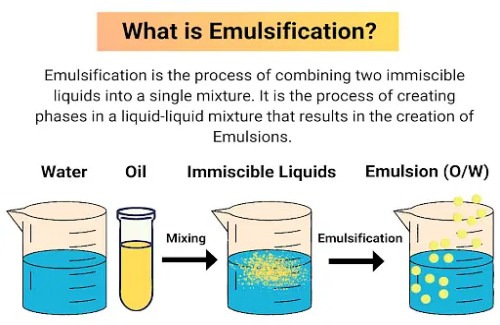Find out Exactly How an Emulsifier in Food Can Help Achieve Perfectly Combined Recipes Every Time
Emulsifiers are vital active ingredients in the cooking world, allowing the mixing of oil and water-based parts. Their ability to lower surface area stress enables the production of steady mixes, improving both appearance and taste in numerous dishes. Recognizing exactly how these compounds feature can change the method one comes close to food preparation. Yet, several stay not aware of the different kinds of emulsifiers and their particular applications. Discovering this topic discloses valuable insights for achieving culinary excellence.
What Are Emulsifiers and Just How Do They Function?
Emulsifiers play a vital role in the food sector by allowing the secure blending of active ingredients that usually do not combine, such as oil and water. These compounds have both hydrophilic (water-attracting) and hydrophobic (water-repelling) residential properties, enabling them to engage with both kinds of active ingredients. When an emulsifier is included to a mix, it minimizes the surface stress between the oil and water, facilitating the formation of tiny droplets of one fluid dispersed within the other. This process creates a secure solution, preventing separation with time and enhancing texture and mouthfeel. Emulsifiers are fundamental in various foodstuff, from salad dressings to gelato, ensuring uniformity and top quality. They likewise add to the general sensory experience of food, affecting flavor launch and aesthetic charm. Recognizing just how emulsifiers function is necessary for food researchers and chefs alike, as they seek to produce well balanced and delightful cooking experiences.
Typical Kinds Of Emulsifiers Utilized in Food Preparation
Various sorts of emulsifiers are made use of in cooking to attain wanted appearances and security in different food products. Typical emulsifiers include lecithin, which is naturally discovered in egg yolks and soybeans, and is widely used in mayo and dressings. One more common emulsifier is mustard, which has compounds that help mix oil and water in sauces.
In addition, industrial emulsifiers such as mono- and diglycerides are often contributed to processed foods to boost their stability and enhance life span. Starch-based emulsifiers, stemmed from corn or potatoes, are additionally employed in sauces and puddings for enlarging and appearance. Casein, a milk healthy protein, offers as an emulsifying agent in milk products like cheese and cream. Each of these emulsifiers plays a vital duty in making certain that active ingredients blend seamlessly, offering the desired uniformity and flavor in culinary developments.
The Scientific research Behind Emulsification

The security of a solution counts on the balance between the pressures acting on the spread droplets. If the beads integrate, the emulsion can break, leading to separation. Various factors, such as temperature level, focus of the emulsifier, and the technique of blending, influence the success of emulsification. Comprehending this clinical foundation is important for achieving regular outcomes in cooking applications involving emulsions.
Tips for Using Emulsifiers in Your Recipes
When incorporating emulsifiers right into recipes, cautious factor to consider of their homes and capability can considerably improve the end product. One need to choose the appropriate emulsifier based on the preferred structure and stability of the recipe. Typical alternatives include egg, lecithin, and mustard yolks, each offering one-of-a-kind advantages
It's necessary to recognize the temperature level at which the emulsifier works ideal; for example, some emulsifiers function efficiently at area temperature level, while others call for heat. Progressively including oil to the emulsifier while blending can help produce a steady solution.
Additionally, the ratio of emulsifier to fluid Our site is important; also little may Get More Information cause splitting up, while way too much can create an unfavorable appearance. Finally, proper storage conditions ought to be thought about, as some emulsified items may need refrigeration to keep security and freshness. By following these ideas, chefs can achieve constantly well-blended dishes.

Delicious Recipes Featuring Emulsifiers
While many chefs might not realize it, including emulsifiers into recipes can boost dishes to brand-new elevations of taste and appearance. As an example, a timeless vinaigrette advantages significantly from the addition of mustard, which works as an emulsifier, giving a smooth uniformity that binds oil and vinegar perfectly. Homemade mayonnaise showcases the power of egg yolks, producing a luscious, luxurious sauce best for salads and sandwiches. - Emulsifier In Food
In baking, emulsifiers like lecithin can help accomplish a tender crumb in cakes and muffins, improving dampness retention. A rich chocolate ganache, made with heavy cream and chocolate, can likewise include an emulsifier to preserve a smooth finish. Furthermore, ice creams frequently make use of emulsifiers to ensure a velvety structure and stop ice crystal formation, leading to a delightful dessert experience. By incorporating these emulsifying representatives, cooks can create dishes that thrill the taste buds and provide a gratifying mouthfeel.
Often Asked Inquiries
Are Emulsifiers Safe for People With Food Allergies?
Emulsifiers can be risk-free for people with food allergic reactions, relying on the details emulsifier made use of. Cross-reactivity and individual sensitivities vary; consequently, speaking with a healthcare expert is a good idea to assure safety.
Can I Make My Own Emulsifier in your home?
Yes, people can create homemade emulsifiers using active ingredients like egg yolks, mustard, or honey. These natural alternatives can successfully mix oils and water-based components, supplying a simple solution for various cooking applications.
How Do Emulsifiers Impact the Nutritional Worth of Food?
Emulsifiers can boost the dietary value of food by improving nutrient absorption and security. Nonetheless, excessive usage may result in unfavorable impacts, possibly modifying food digestion processes and impacting digestive tract wellness in delicate individuals.


Are There Any Type Of Adverse Negative Effects of Consuming Emulsifiers?
Some research studies suggest that consuming emulsifiers might lead to gastrointestinal concerns or interrupt digestive tract microbiota balance. Additional research is needed to totally understand their long-term impacts on health and possible unfavorable side effects.
Can Emulsifiers Change the Flavor of My Dishes?
Emulsifiers can subtly alter the taste account of dishes. By boosting appearance and mouthfeel, they might make tastes much more well balanced or pronounced, however they normally do not impart solid preferences on their own.
Emulsifiers play an important role in the food industry by allowing the stable blending of components that typically do not incorporate, such as oil and water. Various types of emulsifiers are visit used in food preparation to accomplish desired structures and stability in different food items. Furthermore, industrial emulsifiers such as mono- and diglycerides are usually included to processed foods to boost their stability and improve rack life. It's essential to comprehend the temperature at which the emulsifier operates finest; for instance, some emulsifiers function efficiently at space temperature level, while others need warm (Emulsifier In Food). Emulsifiers can be secure for people with food allergies, depending on the particular emulsifier made use of